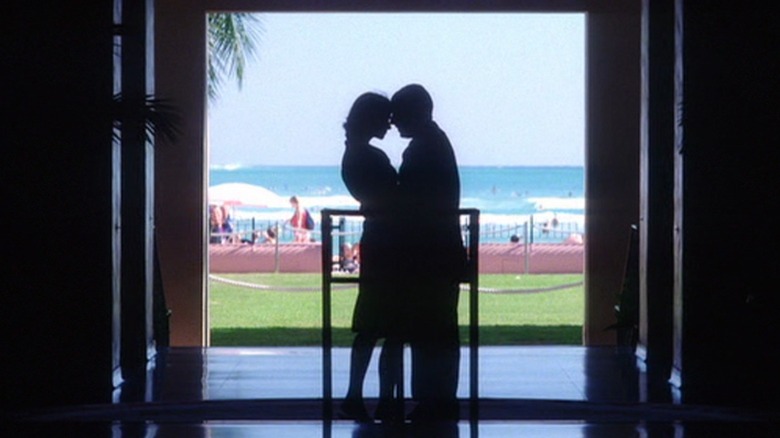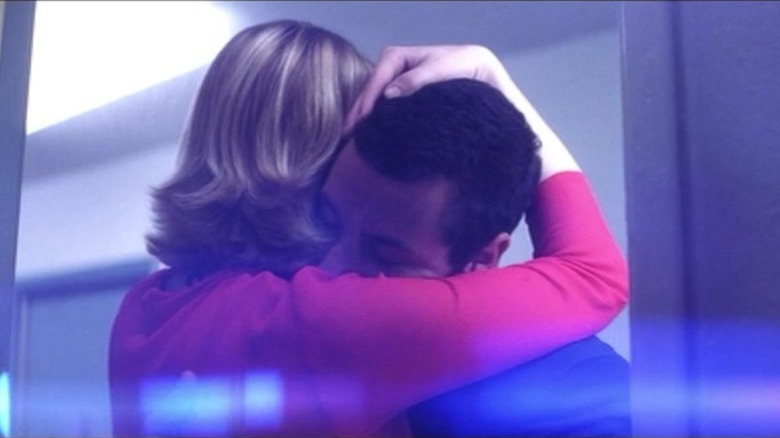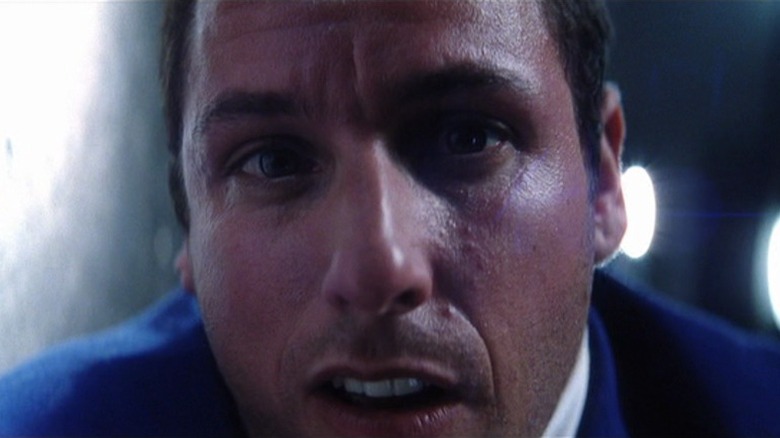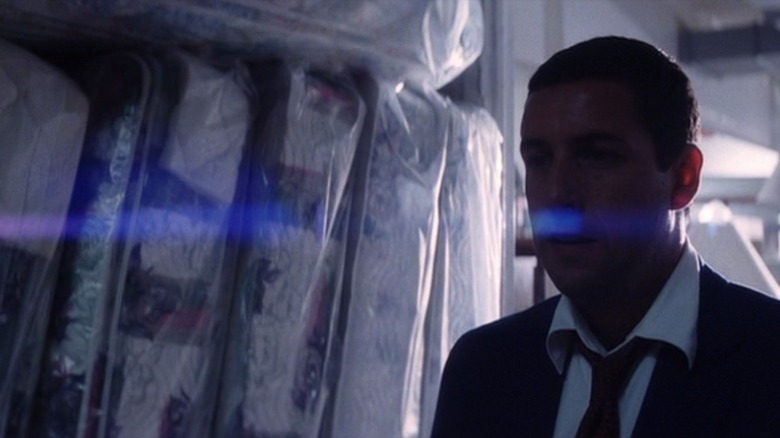Why Paul Thomas Anderson Was Dead Set On Casting Adam Sandler In Punch-Drunk Love
Coming off the heels of the epic masterpiece that was 1999's "Magnolia," Paul Thomas Anderson needed a break. The massive ensemble casts of both that movie and 1997's "Boogie Nights" (which featured many of the same collaborators) as well as their massive respective runtimes had signified Anderson as a director of note. They were loaded with (sometimes literally) explosive scenes, teary confessions, a beautiful eye for San Fernando Valley views, and unforgettable widescreen images. His follow-up, "Punch-Drunk Love," would simultaneously have Anderson refining his established style and also abandoning his comfort zone.
Where Anderson took his talents next was perhaps the most shocking thing a director of his reputation and critical praise could do: make an Adam Sandler romantic comedy. The actor was often accused of polluting the multiplex with lowbrow, dumbed-down slapstick. The idea that a director known for quirky, literate ensemble epics would pair off with Sandler was anathema to a number of critics, many of whom noted their surprise while interviewing Anderson.
When he explained his "Punch-Drunk Love" plans to John Patterson of The Guardian in a 2000 interview, for instance, Patterson assumed he was being facetious. And Anderson's producer JoAnne Sellars was similarly "befuddled," per IndieWire.
But what made "Punch-Drunk Love" so special wasn't just Anderson making a movie with an unfamiliar cinematic grammar. Nor was it the result of Sandler working in a new, emotionally complex terrain. It came from Anderson's deep love for Sandler's work, and his honest attempt to pay tribute.
Anderson's actors
Paul Thomas Anderson loves actors. On the "Boogie Nights" DVD commentary, you can hear the glee he feels just getting to write for his cast, to see actors he's admired all his life speak his dialogue.
He also sees things in these actors that might not be immediately apparent. According to Cigarettes and Red Vines, he wrote longtime friend John C. Reilly a "romantic leading man" role for "Magnolia," giving the actor a chance to go beyond his more comic persona towards something more searching. For "Licorice Pizza," he didn't even cast established actors in the leading roles, trusting that Alana Haim and Cooper Hoffman would be able to hold the movie up.
Still, Adam Sandler was a different situation altogether. By the time Anderson began to conceptualize "Punch-Drunk Love," Sandler was still a box office powerhouse regularly releasing gross-out PG-13 comedies. His movies were dumb but very funny, built around a strong comedic character type he had been honing since his time on "Saturday Night Live": a particular kind of man-child with a penchant for anger and outbursts, often played for maximum comedic effect in movies like "Billy Madison" or "The Waterboy."
These movies were wildly successful financially (see Box Office Mojo) and largely failures critically (see Rotten Tomatoes). Pretty much the opposite fate that had befallen the critically beloved but niche Paul Thomas Anderson. So what did he see in Sandler? What was the actor's hidden quality that only the wide-eyed director could note?
The Sandler formula
"I just cry with laughter in his movies," Paul Thomas Anderson said of Adam Sandler to The Guardian in 2000. And talking to the notorious Sandler skeptic Roger Ebert (shortly after the critic filed a shockingly positive review of the film), Anderson got deeper and more personal: "if I've ever been kinda sad or down or whatever, I just wanna pop in an Adam Sandler movie."
As Anderson envisioned it, his film would follow the broad strokes of a Sandler film. The antisocial man-child character gradually gets into hilarious trouble and eventually, perhaps through the love of a good woman, grows into a fuller, more adult version of himself. In this case, lonely Barry Egan (Sandler) works a job marketing novelty plungers out of a garage, and his big freakout happens early on, as his sisters taunt him at a dinner party.
One of his sisters pushes him to talk with a female friend of hers, Lena (Emily Watson). She's the perfect foil to Sandler — quiet and sophisticated. Meanwhile, a misguided attempt at finding connection through a phone sex hotline is putting financial pressure on Barry. And on top of that, Barry is buying thousands of dollars in pudding for free airline miles. It's all a bit ridiculous, not unlike Sandler's own Happy Madison comedies.
Anderson's take
The antics in "Punch-Drunk Love," as well as its central love story, could come from any Adam Sandler movie, meaning Paul Thomas Anderson fulfilled the job he set out to do. Still, the movie feels wildly different from anything else in Sandler's filmography, even the rare dramatic roles he has done since like the Safdie Brothers' "Uncut Gems," another movie where the filmmakers knew their lead actor had to be Sandler.
The movie is funny and sweet, but also bizarre and surreal, leaning into Barry's character with dynamic camera moves and impressionistic flourishes. For as much as Anderson had hoped to make a traditional, 90-minute Adam Sandler movie, he couldn't help but make a PTA movie as well, a best-of-both-worlds ride through the actor's formula for a successful movie.
As Anderson told Roger Ebert in 2002, the feeling the actor gave him was one of joy. The same joy he felt watching a movie like Robert Altman's "Nashville," another ensemble epic that became a touchstone for Anderson's '90s work. While freely associating Adam Sandler with Robert Altman might have been a uniquely Anderson-ian connection, that sense of joy and love is fully on display here, of a director knowing the unique strengths of his leading man and leaning into it with gusto.



